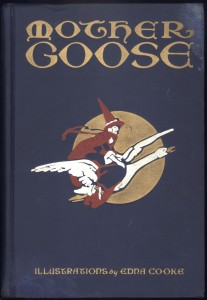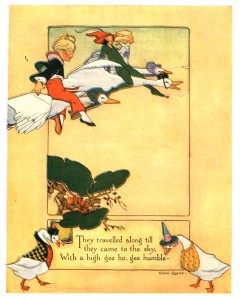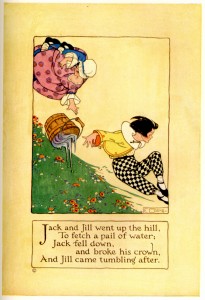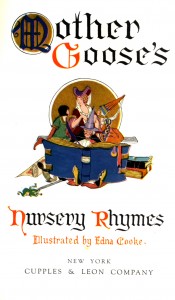
It happened again. I found a title with divine illustrations that I could afford, and ordered it from ABE or another seller on the bookfinder website. I eagerly mutilated the box tearing tape and cardboard in my haste to see the promised art. A Mother Goose naturally, this one illustrated by Edna Cooke, a new artist to me after having found 2 storybooks, during a road trip, full of lush colorful plates. I had enquired, making certain that all plates were present, something I’ve learned from experience isn’t a given. They were, the description of the quality of the book and plates was clear and fine, so here I was ready to ooh and ah over each picture as I turned the musky smelling pages.
Out of register. The frontispiece was out of register. I’ve used the term, but never really looked into its definition–yes, it’s exactly what I thought it was–meaning, the printing process faltered making the plate’s lines and colors jumbled and off, as if you were looking at it after receiving a sharp blow to the noggin. Deep disappointment. No matter how you cut it, out of register plates are useless. OK, I tell myself, so the first plate is off, not all is dire, let’s see the one on the title page–slightly off, not nearly as bad as the frontispiece. So I go through the book plate by plate. One is perfect, crisp, colorful, lines delicate and in place, another slightly off–as if you need glasses, and more plates badly off, so much so it ruins the artwork altogether. Gaging, I would guess at least half are out of register in some manner, and one third off completely. Since there are only 11 color plates within, that’s a large chunk that are useless to the collector of illustrated books.

My question–do booksellers have an obligation to inform a potential buyer of out of register artwork? Should they describe the illustrated plates the way they must the rest of the book–with this detail in mind–as well as any tears, writing, coloring, or water damage it may have suffered throughout the years? I’m aware the cost of the book was low–a total of $18.00 including shipping–but if that’s the reason the book is valued such, shouldn’t the customer be told? Booksellers, if they look within the book they are hoping will leave their inventory, must note schizoid plates. Not describing this problem results in customers like myself, horribly deflated and extremely unlikely to buy from the vendor again.
I was curious as to the causes for misregistration, the term the printers prefer to use. Here’s what I found:
Misregistration is caused by a number of factors.
- “The largest area of problems used to be in the distortion or inaccurate planning of film during the platemaking process. These problems have largely been bypassed with the advent of CTP (computer to plate) platemaking.
- Changes in the temperature or humidity of the environment, which can affect how paper behaves under pressure.
- Stretching of plates during exposure or fitting to the press.
- Inaccuracy of the printing press.
- Human error on press.
- Bad batches of paper.
- Paper bounce and stretch.”



I still see that printing problem in the newspaper business, but it’s not as big a deal for 50 cents a copy. As a one-year bookseller, I can see missing the misregistration (a new term for me) and not mentioning it, but I hope I wouldn’t call them “excellent”! And I would certainly take it back for a refund.
Hey everyone! I am so happy that many people responded to this post, because it’s an issue that has bothered me for quite some time.
And Duncan, I applaud your sentiments! When I sold books, I felt the same way–no customer should be disappointed.
Suzie, although this dealer made this crappy mistake, I don’t believe that most booksellers are out to make money–almost the opposite, no one goes into bookselling to become millionaires. But I understand your anger–I had it to, when the book first arrived.
Tannerybooks-yes, the term excellent was a real mistake. I received another book the same day, a little primer with lovely illustrations, two pages had old tape on them–which was noted in the description. I decided the book was the right price, and bought it, with the knowledge of its defects. I’m just not sure some dealers recognize out of register prints as a defect.
Nancy–you know me, lol. Now that I have some of the illustrations, and all of the black and white, I’m hesitate to let it out of my hands, despite many or most not being correct. Sigh. I know I should send it back, and receive an refund, but I’m not sure I can let the parts that are good go! LOL.
Thanks so much, everyone, for responding, and I’ll definitely check out both of your businesses
Hi Diane,
Thanks for bringing this problem to light: like Jim, I have never heard of this flaw, despite being a longtime lover & buyer-seller of books. I pride myself on the thoroughness & accuracy of my descriptions, but would not have even know to describe this as a flaw in illustrated books. I suspect that this bookseller was similarly unaware rather than negligent or dishonest, but if he or she is of any repute, they should not hesitate to refund your money. On my end, thanks for the education!
The book is not as described and should be returned with full refund and paid for shipping to get it back to the bookseller. If there is ANY negative response REACT!
If the bookselller belongs to an association (IOBA, ABAA etc) complain to the association with the images of the book illustrations and the description. The same complaint should be registered with Abebooks if that is where it was purchased from. The disappointment you had is totally unacceptable in our business. Mistakes happen however the difference between an amateur and a professional is in this case the professional admits the mistake (as I have done when mistakes were made) and corrects it immediately along with a very very sorry message. Nobody should be a sad owner!
Duncan McLaren, Lord Durham Rare Books
I’m echoing Duncan, contact the bookseller. Some sellers don’t understand why people collect books and only care about the money, they need educating.
Suzie,
While I agree with you that the bookseller should take the book back. I also think that this is not a common complaint or more booksellers would be aware of this flaw. Also, if you want a bookseller to take the care in describing the book like it was a valuable collectible don’t expect to pay $18 for it. It’s not that booksellers care so much about money to stock away in their Scrooge McDuck-like vault (where they spend their spare time counting, rearranging and rolling in gold coins), they’re more interested in paying bills and those that sell lower-priced books cannot describe them as well as they would a $400 book –the economics of the situation does not allow for it. Usually on a book under $20, you try to grade the book for the overall condition and then mention one or two of the most notable flaws along with a strength (“tight and intact”), etc. I’m not even sure that if I used the term “out of register” in a book description that many book collectors or dealers would understand what I was trying to say.
Jim
Acorn Books
How very disappointing!
I’d certainly kick up a fuss and complain; excellent illustrations are not what you received.And I’d use the refund to buy a truly excellent one.
From a bookseller perspective, we usually only have one copy at a time and may have never seen that specific edition before, so often it’s hard to say whether EVERY copy of the edition has that flaw or just your copy. If EVERY copy has it in that specific edition, then that’s the way the book was made. When you catalog a book there are so many factors to look at and grade and often you work off of a mental checklist. When I look at plates, I tend to look for the presence of all plates (number) and for tears, creases and/or soiling. I have to admit I rarely spend much time looking at the illustrations and this is the first time I’ve heard any discussion about this flaw despite being in the business for over twenty years. This is precisely the reason booksellers do have return policies.
I think you definitely have reason to return it, but I wouldn’t be too hard on the bookseller (unless you’re given a hard time about the return). JMO.
Jim
Acorn Books
Been in the book business for 22 years and have never heard this term. As one poster said…since you only usually have one of these books at a time you most likely would not realize this. Why kick up a fuss with the seller? He probably doesn’t know the term either. A nice word to him and a description will probably give you a fast return on this book. JMHO
Josie
Josie, Hello! I wasn’t going to kick up a fuss with the seller. And despite what Jim and you believe, having one book at a time doesn’t make a bit of difference. If the illustrations are out of register, they are out of register–doesn’t matter if this book is the only one, or several in a print run are–the one in the possession of the bookseller is the one that counts.
I think people who sell illustrated books as a main part of their business are more careful. I’m certain that pros like Alphabet Books and Jo Ann Reisler check every copy they come across for faults along that line. And yes, they charge for that perfect copy. It isn’t so much that my copy has out of register plates, as this fault is never part of the description. And believe me, having worked for several years in bookstores, I understand the workload that may make it difficult to check for this particular fault–but it is a fault. And those who collect, know its a fault, and will avoid buying from those sellers who don’t know it’s a fault.
Entire print runs do not have several out of register plates in them, or they wouldn’t be acceptable. There are always some books that may have one plate that the printing messed up, and that’s the way it goes. But for most of the plates to be this way, makes the book almost useless to the collector.
It’s a peeve I’ve had for years, and was happy to expound upon it here!
I’m not going to try to convince or argue with any here. Having never heard of this flaw AND having no other copy to compare to does make a difference. I have sold on Amazon since they started selling online and before that when they faxed lists of books to me. I had NEVER heard of this flaw…have talked to hundreds of sellers and had never come across it. Had I seen a copy for myself I probably would have thought it was the norm for the ‘time.’ And the term ‘out of register’ would still not have meant anything to me. I’m going to search my books today to see what I find on this. And not dealing much in ‘old’ books I may not find anything. I do have some older children’s books and am gong to check them out. I’m glad I just happened to check this ‘bookmarked’ site last night!!!
Josie
Josie, hello again! As I mentioned, if your main focus in the book industry was illustrated books, then you would have come across this problem many times. And, you would know what out of register is, what it looks like, and how affected the illustration is, without having another copy available to you. It’s like seeing a bruise on a banana, you don’t need to see the rest of the bunch to know it’s damaged. Granted, bananas are a lot more common than illustrated books, but you get my point. Those who deal primarily with illustrated books can spot out of register illustrations immediately. I don’t sell illustrated books, but have collected them for decades, and can spot it at a glance.
There is no ‘norm’ for the times. 1930 wasn’t in the printing dark ages, lol, and although the process has changed, the problems with layers within that process still remains. Anyway, it’s interesting to me that so many seasoned book dealers never dealt with this problem. Or, perhaps, just never recognized it as one, which is one of the points I make in the article. Hopefully, that will change.
Thanks for sharing such an amazing article.
Had I seen a copy for myself I probably would have thought it was the norm for the ‘time.’ And the term ‘out of register’ would still not have meant anything to me. I’m going to search my books today to see what I find on this. And not dealing much in ‘old’ books I may not find anything. I do have some older children’s books and am gong to check them out. I’m glad I just happened to check this ‘bookmarked’ site last night!!!
Josie